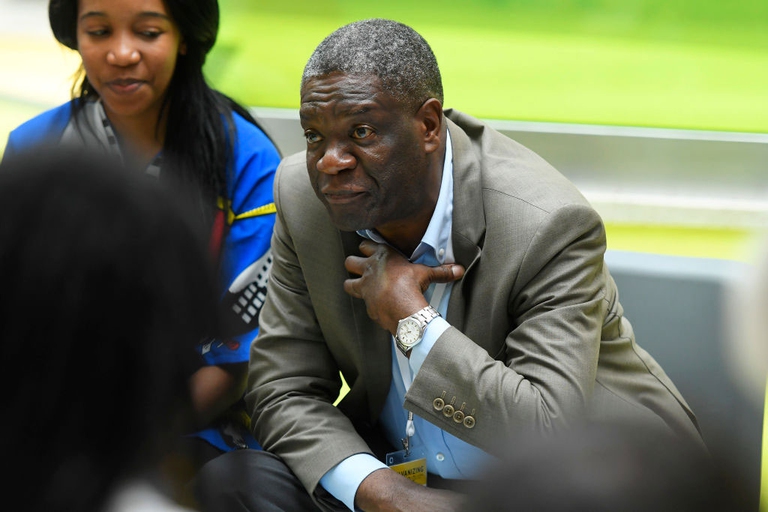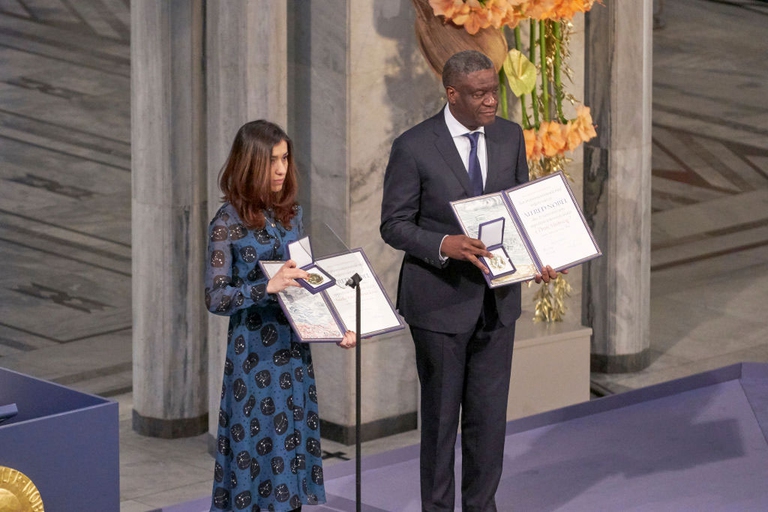
Denis Mukwege, who was awarded the Nobel Peace Prize in 2018, is known as the “doctor who mends women” because in his hospital in Africa he healed thousands of rape victims, in their body and soul. We interviewed him in Milan.
Denis Mukwege received the 2018 Nobel Peace Prize seventy years after the Universal Declaration of Human Rights was adopted. While taking care of women who had been raped by Congolese soldiers, he saw atrocities he doesn’t want to hide.
He’s known as “the doctor who mends women”. And he is so much loved by the people of his hometown, Bukavu, in the Democratic Republic of the Congo, that when he was forced to flee to Europe they begged him to come back and even bought him a plane ticket with their own savings. On his return they welcomed him lining up by the side of a 20-mile long road that leads from the airport to the city centre.
Read more: Nadia Murad, 2018 Nobel Peace Prize winner, the woman who triumphed over violence by telling her story
Denis Mukwege has taken care of more than 50,000 women at Panzi Hospital, which he founded in Bukavu in 1998. He’s specialized in gynecology and he is considered the world leading expert in the treatment of physical damage linked to rapes. “My patients are like a ripped tissue: you have to take every single strand and tie them together again one by one,” the doctor said in an interview with Tpi. He has dedicated his life to the victims of sexual abuse, and every day looks after women, even children, whose body and soul were torn by war.
Gold, diamonds, copper, cobalt, zinc, coltan: the Democratic Republic of the Congo is rich in resources. The greed for them is often the cause behind the conflicts that break out everyday. And gang rapes carried out by the militia are just as much frequent. During the Kivu and Ituri conflicts, from 2004 to 2008, four women were raped every five minutes. Mukwege was there to mend their wounds and try to put the pieces of their hearts back together.
His first patience had suffered such severe violence that she was no longer able to retain urine and feces. “Doing something like this has nothing to do with sexual desire. It’s thirst for destruction,” the gynecologist explained. Despite everything being hard since the beginning, he didn’t cower: he continued to help thousands of women who had been tortured inhumanely. “Rapes don’t only destroy them, but the whole society. Victims are considered guilty by their husbands, they are kicked out and forced to isolation by the rest of the community”. Not to mention that many of them get AIDS.
This year’s laureate Denis Mukwege speaking at today’s #NobelPeacePrize award ceremony. pic.twitter.com/CjRQarqoTU
— The Nobel Prize (@NobelPrize) 10 dicembre 2018
Panzi, however, is a safe shelter. Girls don’t feel judged there, and they can find someone who gives them the hope of being able to return to life. Like deer dazzled by the lights of a racing car, they haven’t manage to escape, they’ve been wounded, but someone has picked them up, rescued them and after healing them he has set them free again.
It’s incredible to see these suffering people being still able to thank God, and having the strength to work. I also wonder how they can sing, when they struggle to survive. They can still sing, and that makes me happy.Dr. Denis Mukwege
Doctor Mukwege has many times denounced the situation in his country and accused the Congolese government neither to have punished the perpetrators of the rapes nor to have put enough efforts to stopp the use of sexual violence as a weapon of war. In September 2012 he gave a powerful speech at the United Nations, confronting the international community. The words he used have cost him dearly, as four armed men entered his home the following month to kill him. He managed to escape, then he sought refuge in Europe. Before coming back to Bukavu.
He couldn’t stay away from his patients. That’s why he was honoured the 2018 Nobel Peace Prize, which he received in Oslo seventy years after the Universal Declaration of Human Rights was adopted. Denis Mukwege has never stopped fighting against one of the worst violations of those rights, one of the sneakiest arms of a conflict, which too often we hear about even where there is no war: gender violence.
Siamo anche su WhatsApp. Segui il canale ufficiale LifeGate per restare aggiornata, aggiornato sulle ultime notizie e sulle nostre attività.
![]()
Quest'opera è distribuita con Licenza Creative Commons Attribuzione - Non commerciale - Non opere derivate 4.0 Internazionale.
Denis Mukwege, who was awarded the Nobel Peace Prize in 2018, is known as the “doctor who mends women” because in his hospital in Africa he healed thousands of rape victims, in their body and soul. We interviewed him in Milan.
La giornata dell’Onu rimarca l’importanza della Dichiarazione universale dei diritti umani celebrando e promuovendo tali diritti.
L’obiettivo della giornata è quello di contrastare una piaga che affligge ancora il 35 per cento delle donne nel mondo. Sono però numerosi gli esempi di donne che si oppongono alla violenza e lottano per la libertà.
The Congolese government is allowing energy firms to bid for access to its vast oil and gas reserves, risking terrible ecological and climate effects.
Nicole Menemene founded Plastycor to help fight plastic pollution, inspiring women and young people to join the cause and protect the environment.
The United Nations World Food Programme has been awarded the 2020 Nobel Peace Prize for its work in the fight against hunger.
Actor and environmental activist Leonardo DiCaprio has contributed two million dollars to a fund to protect Virunga National Park in Congo from threats such as terrorism, the coronavirus and poaching.
Apple, Dell, Microsoft and Tesla are among the tech companies named in a lawsuit brought in the US by the families of children killed and maimed in cobalt mining activities in the Democratic Republic of Congo.
The 26th edition of the United Nations Climate Change Conference, COP26, will be held in Glasgow, Scotland in November 2020. The pre-COP will take place in Milan, Italy.









